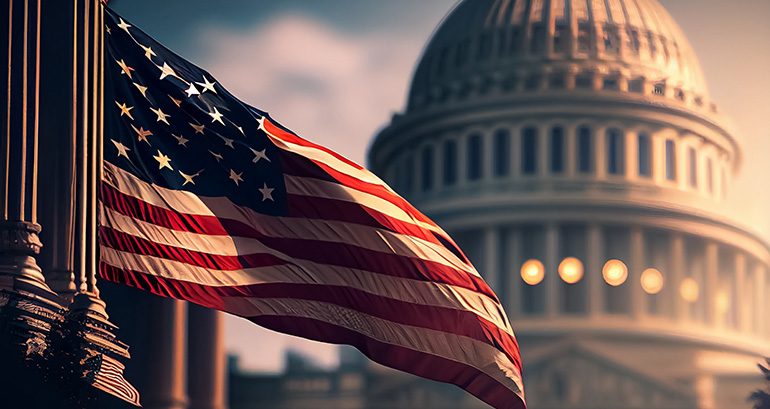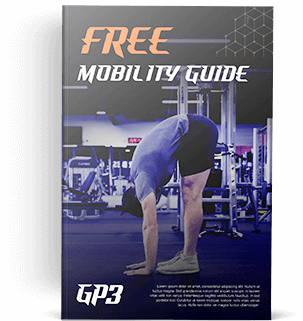Key Points:
- The U.S. has a long history of attempting to limit the influence of wealthy individuals and powerful organizations on elections.
- Recent legislation essentially declaring that “corporations are people, too,” counters this while also utterly failing the “common sense test.”
- Banning donations of any kind from non-individuals (while also maintaining individual donation limits at their current levels) would much more closely match the fundamental principles of democracy upon which this country was founded.
Estimated reading time: 6-12 minutes
Listen to this episode on Spotify!
Last week, we discussed the perception versus the reality of the U.S.’s political hyper-polarization problem. Comfortingly, it’s not nearly as bad as we’re often led to believe, but that doesn’t mean things are all hunky-dory. No, though extreme voices are small in number, they are loud and often powerful.
So, what can we do about that?
One solution is actually quite simple. Make it illegal for any entities other than individuals to donate to political campaigns. Now, I’m under no illusion that this would be a popular suggestion on Capitol Hill. But so far, all objections I’ve found to this proposal are rooted in the self-interest of those currently in power, rather than genuine concern for the state of the nation. Also, while no single action could outrightly “fix” (whatever that may mean) a system as complex as U.S. politics, this one would certainly go a long way.
Dark Money: One Root of All (Political) Evil
Do you know how much an individual is allowed to donate to a particular political candidate? $3,300. Per candidate, per election. This means every election cycle (the primary plus the general) a U.S. citizen can only contribute $6,600 to their favored candidate. In the grand scheme of things, that’s not a ton, especially when you consider that in the 2020 election cycle, candidates for president and congress raised $14.4 billion dollars, over double the previous record.
However, thanks to the 2010 Supreme Court decision in the case of Citizens United v. Federal Election Commission, corporations and other organizations are not subject to the same limitations as individuals. Through somewhat complicated but perfectly legal contortions, organized groups may donate unlimited amounts of money. Further, depending on the type of organization, a political nonprofit 501(c)(4), for example, these groups are under no obligation to disclose the sources of their funding.
This means wealthy individuals with an ideological axe to grind can circumvent the rules, exerting oversized influence on elections, all while remaining safely hidden in the metaphorical shadows.
Dark money, indeed.
So, if you’ve ever wondered why candidates with fringe ideas, often running for House of Representative seats, have gotten elected despite appearing well, sort of crazy, dark money is one answer.
A study in the 2020 issue of the American Journal of Political Science found strong evidence that primary donors increase political polarization. And this makes sense. With smaller voter turnout in primaries, and many districts being comfortably secure as red or blue thanks to gerrymandering, those with extreme views have a much greater chance of winning. So, campaign money that can fund these candidates’ expenses and viciously attack their opponents can be more influential than they would in general elections.
This has the unfortunate side effect of drawing moderate candidates towards the poles of their party, at least during primaries, which makes them appear more and more dangerous to those on the other side of the aisle. Plus, when candidates receive seven-figure sums (or more) from particular groups, they tend to feel beholden to helping enact their wishes once in office. I can think of few cycles more vicious.
But as I said, there’s one easy step we can take.
To reiterate, ban all campaign donations from non-individual sources.
Plus, the limits should remain at their current levels ($3,300). Just like each individual only has one vote per election, it makes sense for each individual to only have one method of contributing financially to each candidate, and for this limit to be set at a level within reach for a healthy proportion of the electorate.
When researching this piece, I wondered if this idea would be perceived as (ironically) too extreme, out of step with centuries of United States’ political tradition. Imagine my surprise when I learned that corporations’ ability to donate without restriction is barely older than my 5th-grade nephew! In fact, the U.S. has a long history of attempting (with varying degrees of success) to limit campaign contributions from organizations of all kinds.
According to the Federal Election Commission’s website, the first piece of campaign finance law was passed in 1867, a somewhat obscure piece of legislation barring federal officers from soliciting donations from Navy Yard workers. Apparently this must have been a noteworthy problem at the time. Anyway, between that law in 1867 and the Federal Election Campaign Act of 1971, “Congress enacted a series of laws which sought broader regulation of Federal campaign financing. These legislative initiatives, taken together, sought to:
- Limit contributions to ensure that wealthy individuals and special interest groups did not have a disproportionate influence on Federal elections;
- Prohibit certain sources of funds for Federal campaign purposes;
- Control campaign spending; and
- Require public disclosure of campaign finances to deter abuse and to educate the electorate.”
That didn’t really pan out, huh?
But I’ll give credit where it’s due. At least these intentions were noble. Notably, the Tillman Act of 1907 barred corporations and national banks from contributing any money to federal campaigns. Four years later, an amendment to the law prohibited these organizations from contributing to Senate races as well.
It must be said that throughout the last hundred and fifty years, powerful groups have certainly sought and found loopholes to these regulations. Corporations and other organizations still discovered ways to exert influence on elections in ways that certainly violate the spirit of the four goals listed above. That was, until the aforementioned Citizens United ruling in 2010, when the Supreme Court decided that none of these principles should apply.
Unfortunately, this ruling fails the “common sense test.”
This decision hinged on two key opinions, which we can sum up thus:
- “Corporations are people, too.”
- “Limiting their ability to donate violates free speech.”
Now, I grant that the Supreme Court justices possess some of the most brilliant legal minds in the country. By definition, they should be generationally gifted in their field in order to hold such a high office. However, one must perform Olympic gold medal-worthy mental gymnastics in order to justify either of the above two assertions. So, let’s logically debunk them.
- Corporations are people.
You can sort of see where they were going with this. Essentially, because companies are made up of people, they should have the same rights as people. Except, corporations are not people. Corporations are entities designed with the explicit purpose of achieving a profit to pass on to shareholders, owners, and other interested parties. This is their fundamental purpose. Their reason for being.
It is as unreasonable to expect a corporation to exercise moral judgment that hurts its bottom line as it is to expect a wild bear not to eat a raw steak one carelessly left on a picnic table. Unlike with people, who are capable of looking past blatant selfishness, decisions that don’t align with blatant self-interest go against a corporation’s very nature.
Besides, all the people within a corporation already have their own individual rights, so there is no need to extend these rights to the organization itself. Doing so also has important implications for claim number two.
- Limiting political donations is a violation of free speech.
I’m sorry, but no. Just, no. The act of giving money and the act of speaking words are two completely different things. In fact, you can pay for something without speaking, and you can speak without spending any money. I know, it’s brilliant insights like these that keep you coming back to this blog each week.
But let’s dive a little deeper. If limiting political donations for corporations violates their free speech, why does the $3,300 donation limit not violate an individual’s free speech? By this logic, corporations should either be subject to the same limit as individuals, or individuals should be able to make unlimited donations. Proposing the latter would likely constitute political suicide for just about any candidate, as it clearly violates fundamental equality principles of democracy upon which democracy is founded. And limiting corporations to a $3,300 contribution wouldn’t have much of an impact on any election.
As I said, the Citizens United decision doesn’t stand up to any sort of scrutiny. So, how could smart, powerful people like Supreme Court justices have made such basic logical errors?
Well, the key word there is “powerful.”
Fascinating research, conducted over twenty years by UC Berkeley professor Dacher Keltner (and others), discovered something fascinating. “Subjects under the influence of power acted as if they had suffered a traumatic brain injury—becoming more impulsive, less risk-aware, and, crucially, less adept at seeing things from other people’s point of view.” The implications of this could be worthy of an entirely separate blog post, but it sure seems that the old cliche about power corrupting is right on the money. So, it makes sense that Supreme Court justices, some of the most powerful people in the country, would be out of touch with the way everyday citizens perceive the world.
It also makes sense that people (both powerful and not) may believe that wealth should bring increased political influence. As I’ve written before, capitalism is Western society’s favorite game. It richly rewards those who are good at it with fame, privilege, and power. The notion that one would be unable to use their wealth to influence elections in the way they want may feel especially hard to swallow, given that this strategy would work in nearly every other domain of life.
But, that’s not how democracy is supposed to work.
Just like everyone only has one vote, everyone should only be able to contribute $3,300 per candidate. No exceptions or workarounds through organizational donations. Besides, even if we’re totally unwilling to accept strict equality in this regard, the ultra-wealthy would still be able to use their influence by donating to multiple candidates in multiple races. They simply wouldn’t be able to confer an unfair advantage on a particular candidate with a massive donation.
Instead, special interest groups would have to be organized organically, by convincing individuals one by one of the importance of certain issues. Would that be harder, more time-intensive, and less efficient than throwing a bunch of money at one candidate? You bet. But that’s the point.
Recall last week’s mention of the More in Common survey. If only 14% of people combined fall at the extreme ends of the political spectrum, those at the poles should need to work much harder to install politicians whose views are out of step with the other 86%. That way, our politics would follow common sense for a change. Wouldn’t that be nice?
Before you go, I’d love to hear from you. I’ve yet to find anyone who disagrees with this idea of limiting donations strictly to individuals. If you do, please let me know what I haven’t thought of, or why I’m incorrect. I’m always open to healthy debate. Reply to this email, and let’s talk!

